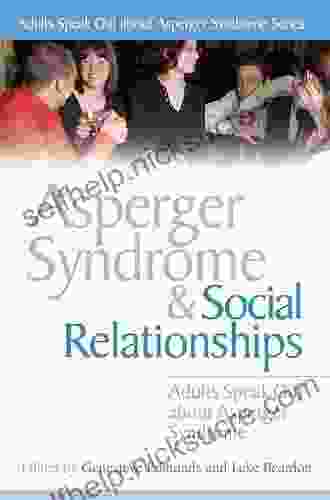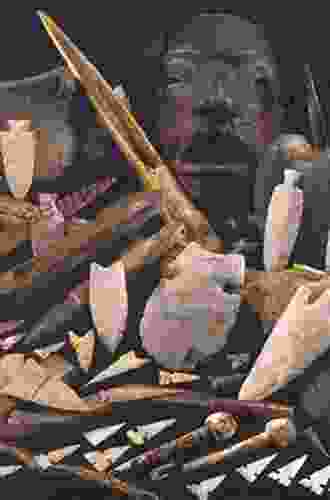Empowering Socially Challenged Teens and Young Adults: A Comprehensive Guide for Parents, Educators, and Caregivers

Adolescence and young adulthood are pivotal stages of life characterized by significant social development. However, for some individuals, social challenges can hinder their ability to fully engage in these formative experiences.
4.5 out of 5
| Language | : | English |
| File size | : | 795 KB |
| Text-to-Speech | : | Enabled |
| Screen Reader | : | Supported |
| Enhanced typesetting | : | Enabled |
| Word Wise | : | Enabled |
| Print length | : | 385 pages |
| Lending | : | Enabled |
Socially challenged teens and young adults may face difficulties in forming meaningful relationships, communicating effectively, and participating in social situations. This can lead to isolation, loneliness, and a reduced sense of well-being.
Understanding the complexities of social challenges and adopting effective support strategies are crucial for parents, educators, and caregivers. This comprehensive guide aims to provide insights, strategies, and resources to empower these individuals and foster their social development.
Understanding Social Challenges
Social challenges can stem from various factors, including developmental disorders, mental health conditions, and environmental influences. Some common challenges faced by teens and young adults include:
- Autism spectrum disorder (ASD): ASD affects social communication and interaction, making it difficult for individuals to comprehend social cues, participate in conversations, and relate to others.
- Social anxiety disorder: This anxiety disorder involves intense fear and avoidance of social situations, leading to significant distress and impairment in daily life.
- Other mental health conditions: Conditions such as depression, attention deficit hyperactivity disorder (ADHD),and obsessive-compulsive disorder (OCD) can also manifest with social difficulties.
- Neurodevelopmental differences: Some individuals may have neurodevelopmental differences that affect their processing of social information and impair their ability to navigate social interactions.
- Trauma: Experiencing traumatic events, such as abuse or neglect, can disrupt healthy social development and lead to social withdrawal or difficulties in forming trusting relationships.
Fostering Social Development
Empowering socially challenged teens and young adults requires a multi-faceted approach that encompasses various strategies, interventions, and resources. Here are some key recommendations for parents, educators, and caregivers:
Parents
- Create a supportive and understanding home environment: Encourage open communication and provide a safe space for your child to express their feelings and challenges.
- Collaborate with professionals: Seek professional guidance from mental health therapists, social workers, or special education teachers to develop a tailored support plan.
- Promote social engagement: Facilitate opportunities for your child to interact with peers in structured and supportive environments, such as social skills groups or extracurricular activities.
- Model healthy social behavior: Show your child how to interact with others respectfully, engage in meaningful conversations, and resolve conflicts effectively.
- Provide technology-assisted support: Utilize technology tools, such as social media platforms or video conferencing, to help your child connect with others and develop social skills.
Educators
- Create inclusive classrooms: Promote a welcoming and accepting environment where all students feel valued and respected.
- Provide differentiated instruction: Offer tailored support and modifications for students with social challenges, such as small group instruction, social skills training, or assistive technology.
- Foster peer relationships: Implement strategies to promote positive peer interactions, such as cooperative learning activities, peer mentoring programs, or social events.
- Collaborate with families: Establish open communication with parents to share observations and work together to develop individualized support plans.
- Seek professional development: Engage in ongoing professional development opportunities to enhance your understanding of social challenges and effective intervention strategies.
Caregivers
- Provide a structured and supportive environment: Establish clear routines, expectations, and social norms to create a sense of predictability and safety.
- Encourage social interaction: Organize social events or activities to provide opportunities for the individual to interact with others in a supervised setting.
- Use visual aids: Utilize visual cues, such as social stories or comics, to help individuals understand social situations and appropriate behavior.
- Promote self-advocacy skills: Teach the individual how to express their needs and preferences, and advocate for themselves in social interactions.
- Collaborate with professionals: Consult with therapists, social workers, or case managers to develop a comprehensive support plan and address any underlying challenges.
Therapeutic Interventions and Mental Health Services
In addition to supportive environments and educational strategies, therapeutic interventions and mental health services can be beneficial for socially challenged teens and young adults.
- Cognitive-behavioral therapy (CBT): CBT helps individuals identify and change negative thoughts and behaviors that hinder social interactions.
- Social skills training: This therapy involves teaching practical skills for interacting with others, such as initiating conversations, managing social anxiety, and resolving conflicts.
- Medication: In some cases, medication can be prescribed to manage underlying mental health conditions that contribute to social challenges.
- Peer support groups: Connecting with others who face similar challenges can provide a sense of community and support.
- Online support platforms: Various online platforms and forums offer safe and accessible spaces for individuals to connect with others and share their experiences.
Resources for Young Adults
Young adults transitioning out of adolescence may require additional support and resources to navigate social challenges and foster their independence.
- College or university support services: Many post-secondary institutions offer resources such as counseling services, social skills groups, and peer mentoring programs specifically designed for students with social challenges.
- Community-based programs: Local organizations may offer social recreation programs, support groups, and employment opportunities for individuals with disabilities or social difficulties.
- Independent living skills training: This training focuses on developing skills for daily living, including social interactions, problem-solving, and decision-making.
- Vocational rehabilitation services: These services provide support and resources to individuals with disabilities who are seeking employment or career advancement.
- Social media and online communities: Social media platforms can be used to connect with others, share experiences, and access support.
Empowering socially challenged teens and young adults requires a concerted effort from parents, educators, caregivers, and mental health professionals. By understanding the challenges they face, adopting effective strategies, and utilizing available resources, we can foster their social development, enhance their well-being, and empower them to live fulfilling lives.
Remember, every individual is unique, and the journey towards social empowerment may vary. By providing a supportive environment, tailored interventions, and ongoing encouragement, we can create opportunities for socially challenged teens and young adults to thrive and reach their full potential.
4.5 out of 5
| Language | : | English |
| File size | : | 795 KB |
| Text-to-Speech | : | Enabled |
| Screen Reader | : | Supported |
| Enhanced typesetting | : | Enabled |
| Word Wise | : | Enabled |
| Print length | : | 385 pages |
| Lending | : | Enabled |
Do you want to contribute by writing guest posts on this blog?
Please contact us and send us a resume of previous articles that you have written.
 Fiction
Fiction Non Fiction
Non Fiction Romance
Romance Mystery
Mystery Thriller
Thriller SciFi
SciFi Fantasy
Fantasy Horror
Horror Biography
Biography Selfhelp
Selfhelp Business
Business History
History Classics
Classics Poetry
Poetry Childrens
Childrens Young Adult
Young Adult Educational
Educational Cooking
Cooking Travel
Travel Lifestyle
Lifestyle Spirituality
Spirituality Health
Health Fitness
Fitness Technology
Technology Science
Science Arts
Arts Crafts
Crafts DIY
DIY Gardening
Gardening Petcare
Petcare Stewart M Green
Stewart M Green Kathy Pike
Kathy Pike Robert Warden
Robert Warden Lisa Fain
Lisa Fain Audrey Coulthurst
Audrey Coulthurst Bernd Brunner
Bernd Brunner Norman Ollestad
Norman Ollestad Peter Levin
Peter Levin Aspen Matis
Aspen Matis Yang Jwing Ming
Yang Jwing Ming Deborah Hughes Hallett
Deborah Hughes Hallett Ken Phillips
Ken Phillips Drew Harris
Drew Harris Stephen Morris
Stephen Morris Prayer M Madueke
Prayer M Madueke Jesus Salcedo
Jesus Salcedo E W Bullinger
E W Bullinger Thane K Pratt
Thane K Pratt John Updike
John Updike Laura Riley
Laura Riley Colleen Hoover
Colleen Hoover Gary Webster
Gary Webster Ken Denmead
Ken Denmead Brett Ortler
Brett Ortler David Shoalts
David Shoalts Lois Lowry
Lois Lowry Paul Pilkington
Paul Pilkington Madelynne Diness Sheehan
Madelynne Diness Sheehan Samir Okasha
Samir Okasha Morgan Murphy
Morgan Murphy John Swinton
John Swinton Ed Jaworowski
Ed Jaworowski Mike Kim
Mike Kim Larry Olmsted
Larry Olmsted Maya Angelou
Maya Angelou Kilian Jornet
Kilian Jornet Ben Riggs
Ben Riggs Fennel Hudson
Fennel Hudson Rick Burgess
Rick Burgess M Prefontaine
M Prefontaine James Ladyman
James Ladyman Joe Hutto
Joe Hutto Mami Wata
Mami Wata Catherine Rodgers
Catherine Rodgers Quick Reads
Quick Reads Rufus Stephens
Rufus Stephens Brian A Hall
Brian A Hall Tiffany Wasson
Tiffany Wasson Dan Morse
Dan Morse Nancy Friday
Nancy Friday Asia Citro
Asia Citro Deanna Roy
Deanna Roy John Sharp
John Sharp Babatunde Peter
Babatunde Peter Vicki Hoefle
Vicki Hoefle Marie Rutkoski
Marie Rutkoski Patricia Stacey
Patricia Stacey Austa Somvichian Clausen
Austa Somvichian Clausen Joe Kelsey
Joe Kelsey Robert E Howard
Robert E Howard Ethan Sawyer
Ethan Sawyer Duncan J Watts
Duncan J Watts Ethan Gallogly
Ethan Gallogly Renzo Gracie
Renzo Gracie Kathy Hirsh Pasek
Kathy Hirsh Pasek Fran Zimniuch
Fran Zimniuch Ayn Rand
Ayn Rand Eric Jones
Eric Jones Hourly History
Hourly History John Littleford
John Littleford Augustus M Walton
Augustus M Walton E Randolph Richards
E Randolph Richards Miriam Manela
Miriam Manela Kay Harris Kriegsman
Kay Harris Kriegsman Proprietary Edition Kindle Edition
Proprietary Edition Kindle Edition Luca Caioli
Luca Caioli Audrey Grey
Audrey Grey Judith Z Kallenbach
Judith Z Kallenbach Roger Lajoie
Roger Lajoie Chris Burkard
Chris Burkard Athena P Kourtis
Athena P Kourtis Richard Strozzi Heckler
Richard Strozzi Heckler Ken Fry
Ken Fry Jens Voigt
Jens Voigt Graham Frankel
Graham Frankel Katie Hoff
Katie Hoff Karen Skerrett
Karen Skerrett Bernie Chowdhury
Bernie Chowdhury Patricia L Thompson
Patricia L Thompson Deborah Miller
Deborah Miller Debora Rasio
Debora Rasio Tracey L Moore
Tracey L Moore Kenneth P Miller
Kenneth P Miller Eric S Raymond
Eric S Raymond Kathleen M Eisenhardt
Kathleen M Eisenhardt Lisa Gache
Lisa Gache Avinash K Dixit
Avinash K Dixit Sarah B Bush
Sarah B Bush Sofia Price
Sofia Price Chris Santella
Chris Santella Family Traditions Publishing
Family Traditions Publishing Jeff Szuhay
Jeff Szuhay Harlan Coben
Harlan Coben Barry Cunliffe
Barry Cunliffe Jerome D Smalls
Jerome D Smalls Cornelia Pelzer Elwood
Cornelia Pelzer Elwood Audre Lorde
Audre Lorde Antoni Porowski
Antoni Porowski The Car Crash Detective
The Car Crash Detective J A Baker
J A Baker Tom Rea
Tom Rea N West Moss
N West Moss Asiphile Qulu
Asiphile Qulu Larry Gonick
Larry Gonick Tony Clunn
Tony Clunn Spike Walker
Spike Walker Jeffrey Freed
Jeffrey Freed Shepherd Mead
Shepherd Mead Shelley Johnson
Shelley Johnson Bradley Stone
Bradley Stone Gemma Mccrae
Gemma Mccrae James Ori
James Ori Dougald Macdonald
Dougald Macdonald Janet Gurtler
Janet Gurtler Chloe Lukasiak
Chloe Lukasiak Andy Mcilree
Andy Mcilree Leonard Mlodinow
Leonard Mlodinow Maureen Connolly
Maureen Connolly Denny Emerson
Denny Emerson Kathy Jackson
Kathy Jackson Ron Dalby
Ron Dalby Brandon Sneed
Brandon Sneed Madeleine Roux
Madeleine Roux Efrain Galeano
Efrain Galeano Tim Muehlhoff
Tim Muehlhoff Rehan Haider
Rehan Haider Catherine Belknap
Catherine Belknap Dave Ramsey
Dave Ramsey R Scott Thornton
R Scott Thornton Don J Sharpsteen
Don J Sharpsteen Carol Ann Rinzler
Carol Ann Rinzler Bill Thorness
Bill Thorness Mohamed F El Hewie
Mohamed F El Hewie Gabriela Rosa
Gabriela Rosa Casey Barber
Casey Barber Pete Whittaker
Pete Whittaker S Ali Myers
S Ali Myers Joe Ryder
Joe Ryder Greta Eskridge
Greta Eskridge Jim Fay
Jim Fay Randi Kreger
Randi Kreger Babu The Panda
Babu The Panda Kevin Kelly
Kevin Kelly Greg Gatz
Greg Gatz Aubrey Hargis
Aubrey Hargis Laura A Roser
Laura A Roser Reinhard Bonnke
Reinhard Bonnke Patrisia Gonzales
Patrisia Gonzales Lori Foster
Lori Foster Siddhartha Mukherjee
Siddhartha Mukherjee Timothy J Jorgensen
Timothy J Jorgensen Keith Mcnulty
Keith Mcnulty Katie Cotugno
Katie Cotugno Sarah Boslaugh
Sarah Boslaugh Mercedes Lackey
Mercedes Lackey Carolyn Wyman
Carolyn Wyman Linda Wong
Linda Wong Ayesha Ratnayake
Ayesha Ratnayake Ellyn Sanna
Ellyn Sanna Mike Mastracci
Mike Mastracci Cat Coluccio
Cat Coluccio Rudy Sanchez
Rudy Sanchez Simon Askey
Simon Askey David J Miklowitz
David J Miklowitz Martin Rees
Martin Rees Darren Palmer
Darren Palmer Martin Liebscher
Martin Liebscher James Garbarino
James Garbarino Zhi Gang Sha
Zhi Gang Sha Jonothan Page
Jonothan Page Mia Baxter
Mia Baxter Paul Bodine
Paul Bodine Alan Vermilye
Alan Vermilye Larry Miller
Larry Miller Arthur Benjamin
Arthur Benjamin Sharon Baranoski
Sharon Baranoski Gillian Bradshaw
Gillian Bradshaw Mark Baker
Mark Baker Lore M Dickey
Lore M Dickey Johnette Howard
Johnette Howard Lucy Hopping
Lucy Hopping Levison Wood
Levison Wood Tarik Unal
Tarik Unal Hillary Davis
Hillary Davis William Woys Weaver
William Woys Weaver Jacqui Letran
Jacqui Letran Peter Bronski
Peter Bronski James Deetz
James Deetz Karl Fulves
Karl Fulves Jessica Nabongo
Jessica Nabongo Ervin Laszlo
Ervin Laszlo Edward Lee
Edward Lee Linda Dobson
Linda Dobson Eitan Bar
Eitan Bar Samantha Bongeka Nqoko
Samantha Bongeka Nqoko David Landis
David Landis Eunice Pennington
Eunice Pennington E Paul Zehr
E Paul Zehr Daria Blackwell
Daria Blackwell Smadar Lavie
Smadar Lavie Kevin Bales
Kevin Bales Geoffrey Budworth
Geoffrey Budworth Sharon Slater
Sharon Slater Nsca National Strength Conditioning Association
Nsca National Strength Conditioning Association Lyn Millner
Lyn Millner Heather E Schwartz
Heather E Schwartz Hilary Scarlett
Hilary Scarlett Dean Karnazes
Dean Karnazes Paul Parsons
Paul Parsons Jessica Seinfeld
Jessica Seinfeld John S Ahlquist
John S Ahlquist Patrick Hamill
Patrick Hamill Vance Packard
Vance Packard Spanked Teen
Spanked Teen Jonathan Cane
Jonathan Cane Florin Grancea
Florin Grancea John Quick
John Quick Ernestine Gilbreth Carey
Ernestine Gilbreth Carey Susan F Paterno
Susan F Paterno Bubba Watson
Bubba Watson Steve Oakes
Steve Oakes Michael Grimm
Michael Grimm Nathan Clark
Nathan Clark Alan Lightman
Alan Lightman Philip Clayton
Philip Clayton Larry Hart
Larry Hart Bob Smale
Bob Smale Jeannie Burlowski
Jeannie Burlowski Audrey Sutherland
Audrey Sutherland Esther M Toddler
Esther M Toddler Joe Friel
Joe Friel Sara Zarr
Sara Zarr Joanne Simon Walters
Joanne Simon Walters Penny Simkin
Penny Simkin Tori Bortman
Tori Bortman Darja Wagner Ph D
Darja Wagner Ph D Gail M Nelson
Gail M Nelson Kristin Fontichiaro
Kristin Fontichiaro Elizabeth M Ward
Elizabeth M Ward Dr Jerisa Berry
Dr Jerisa Berry Charles L Thompson
Charles L Thompson Aubre Andrus
Aubre Andrus Laurie Kennedy Malone
Laurie Kennedy Malone Christopher Burris
Christopher Burris Dana Wechsler Linden
Dana Wechsler Linden Ori Hofmekler
Ori Hofmekler Robert W Sullivan Iv
Robert W Sullivan Iv Claire Nance
Claire Nance Martha Raile Alligood
Martha Raile Alligood Brian Christian
Brian Christian Nancy Owens Barnes
Nancy Owens Barnes John Gray
John Gray Ben Sasse
Ben Sasse William Schoolcraft
William Schoolcraft Lamis Chebbi
Lamis Chebbi Kira Breed Wrisley
Kira Breed Wrisley John Hiker
John Hiker Barbara Blitzer
Barbara Blitzer Sandy Hall
Sandy Hall Casey Schreiner
Casey Schreiner James Feess
James Feess Karen Whitley Bell
Karen Whitley Bell Patrick Holford
Patrick Holford George J Hademenos
George J Hademenos Jerry Scott
Jerry Scott David Code
David Code Lew Freedman
Lew Freedman Roy Benaroch Md
Roy Benaroch Md Nita Sweeney
Nita Sweeney Atlas Kane
Atlas Kane Cora Seton
Cora Seton Rena Ejiogu
Rena Ejiogu Paul Tukey
Paul Tukey Carol Potter
Carol Potter Robert M Bramson
Robert M Bramson Nina W Brown
Nina W Brown Lara Lillibridge
Lara Lillibridge Mary Jayne Baker
Mary Jayne Baker John D Mccann
John D Mccann T Berry Brazelton
T Berry Brazelton Blake Boles
Blake Boles Kindle Edition
Kindle Edition Greg B Smith
Greg B Smith Gerald Paul Clifford
Gerald Paul Clifford Christine Ann Lawson
Christine Ann Lawson Steve Colgate
Steve Colgate Conor Sullivan
Conor Sullivan Nfhs
Nfhs Gabrielle Bossis
Gabrielle Bossis Danny Staple
Danny Staple John Connor
John Connor Ashley Rhodes Courter
Ashley Rhodes Courter Cynthia Hand
Cynthia Hand Heather Heying
Heather Heying John Skinner
John Skinner R F Egerton
R F Egerton Pat Mora
Pat Mora Sam Quek
Sam Quek Daffodil Campbell
Daffodil Campbell Aylette Jenness
Aylette Jenness Jayme Adelson Goldstein
Jayme Adelson Goldstein Dk
Dk Izabelle Winter
Izabelle Winter Kay Wills Wyma
Kay Wills Wyma Steven M Bragg
Steven M Bragg Simon Pridmore
Simon Pridmore Marc D Lewis
Marc D Lewis Martins Zaumanis
Martins Zaumanis Stephanie Donaldson Pressman
Stephanie Donaldson Pressman Emily Whaley
Emily Whaley C M Gray
C M Gray Richard H Immerman
Richard H Immerman G R S Mead
G R S Mead Deanna Pecaski Mclennan
Deanna Pecaski Mclennan Mike Doyle
Mike Doyle Staff Of The Harvard Crimson
Staff Of The Harvard Crimson Matt Forbeck
Matt Forbeck John Austin
John Austin Conrad Goeringer
Conrad Goeringer Todd Mikkelsen
Todd Mikkelsen Clive Finlayson
Clive Finlayson Kaleb Dahlgren
Kaleb Dahlgren James Nestor
James Nestor Dustin Hansen
Dustin Hansen Bruno Barnhart
Bruno Barnhart Colin Towell
Colin Towell Deborah Falaye
Deborah Falaye Carly Gelsinger
Carly Gelsinger Sanya Richards Ross
Sanya Richards Ross Don Casey
Don Casey Nick Fragel
Nick Fragel Robert M Steward
Robert M Steward Leslie T Chang
Leslie T Chang Tracy Deonn
Tracy Deonn Gabriel Gambetta
Gabriel Gambetta Steven Rinella
Steven Rinella Jessica Nordell
Jessica Nordell George Orwell
George Orwell Mark Gardener
Mark Gardener Fred Provenza
Fred Provenza Beverly Conyers
Beverly Conyers John Gierach
John Gierach Greg Lavern
Greg Lavern Tara Sim
Tara Sim Lindsey Philpott
Lindsey Philpott Lawrence A Kane
Lawrence A Kane David Dalglish
David Dalglish Tony Nester
Tony Nester Paul Oliver
Paul Oliver Gaby Melian
Gaby Melian Scott Turansky
Scott Turansky Moon Travel Guides
Moon Travel Guides Rachel Mitchell
Rachel Mitchell Vivian Sandau
Vivian Sandau Liz Carmack
Liz Carmack Beverly Bell
Beverly Bell Fred Mitchell
Fred Mitchell Collins Dictionaries
Collins Dictionaries Michael Paul
Michael Paul Maria Montessori
Maria Montessori Shelly Rainforth Collins
Shelly Rainforth Collins Tara Dixon Engel
Tara Dixon Engel Jim Holt
Jim Holt T J Emerson
T J Emerson Kimberly Willis
Kimberly Willis Qukids
Qukids Tomasz Witkowski
Tomasz Witkowski Sadie Keller
Sadie Keller Richard Ferber
Richard Ferber Peggy Kaye
Peggy Kaye Brooke Dojny
Brooke Dojny Dan Blanchard
Dan Blanchard William M Kelso
William M Kelso Foster Provost
Foster Provost Brent Dykes
Brent Dykes Scott Mactavish
Scott Mactavish Ryan Sleeper
Ryan Sleeper Yogi Ramacharaka
Yogi Ramacharaka Kjell Erik Rudestam
Kjell Erik Rudestam Richard Miles
Richard Miles Robert T Clemen
Robert T Clemen Hugh Acheson
Hugh Acheson Darryl Cunningham
Darryl Cunningham Barbara Oakley Phd
Barbara Oakley Phd Austin Ruse
Austin Ruse Picabo Street
Picabo Street Pedro G Ferreira
Pedro G Ferreira Terry Marsh
Terry Marsh Steven Brill
Steven Brill Brent Runyon
Brent Runyon Gareth Loy
Gareth Loy Larry Dane Brimner
Larry Dane Brimner Nic Stone
Nic Stone Linda Fairley
Linda Fairley Jeff Vandermeer
Jeff Vandermeer Joe Baird
Joe Baird Karen Berger
Karen Berger Dk Eyewitness
Dk Eyewitness M D William W Forgey
M D William W Forgey Warren W Wiersbe
Warren W Wiersbe Marc Kery
Marc Kery Mark Parman
Mark Parman Justine Kerfoot
Justine Kerfoot Mark Coeckelbergh
Mark Coeckelbergh Carl Safina
Carl Safina Gary D Wale
Gary D Wale Richard Boergers
Richard Boergers Cece Winans
Cece Winans Wilfrid Jonson
Wilfrid Jonson Mandy Khoshnevisan
Mandy Khoshnevisan Charles D Garvin
Charles D Garvin Sam Pathy
Sam Pathy Print Replica Kindle Edition
Print Replica Kindle Edition Leigh Pearson
Leigh Pearson Dima Zales
Dima Zales Patty Hahne
Patty Hahne Emenwa Global
Emenwa Global Miriam Erick
Miriam Erick Harry Bauld
Harry Bauld Huw Price
Huw Price Dusty Phillips
Dusty Phillips Terasa Cooley
Terasa Cooley B F Skinner
B F Skinner Stan Fischler
Stan Fischler Deborah T Goldberg
Deborah T Goldberg Don Orwell
Don Orwell Peter Gieler
Peter Gieler Linda West
Linda West Matt Wallaert
Matt Wallaert Fred Alan Wolf
Fred Alan Wolf Uta C Merzbach
Uta C Merzbach Adam Parkinson
Adam Parkinson Bob Weeks
Bob Weeks Jermaine Marshall
Jermaine Marshall Jessica S Olson
Jessica S Olson Laurie Katz
Laurie Katz David Acheson
David Acheson Johny Pitts
Johny Pitts Inga Aksamit
Inga Aksamit Susan M Sheridan
Susan M Sheridan Tom Humphries
Tom Humphries Dory Willer
Dory Willer Seth Kantner
Seth Kantner Janis B Meredith
Janis B Meredith Vb Leghorn
Vb Leghorn Robert Simons
Robert Simons Timo Holmquist
Timo Holmquist Loren W Christensen
Loren W Christensen Rajeev Lal
Rajeev Lal Lise Eliot
Lise Eliot Lilith Dorsey
Lilith Dorsey J C Pater
J C Pater Sonia Mainstone Cotton
Sonia Mainstone Cotton Augustine Wetta
Augustine Wetta Steve Bisheff
Steve Bisheff Conrad Anker
Conrad Anker Deborah J Rumsey
Deborah J Rumsey Robert Chuckrow
Robert Chuckrow Avery Faigenbaum
Avery Faigenbaum Belinda Smith Sullivan
Belinda Smith Sullivan Beatrice Bruteau
Beatrice Bruteau Vasily Mahanenko
Vasily Mahanenko Autumn Carpenter
Autumn Carpenter Suzanne Jurmain
Suzanne Jurmain John Misha Petkevich
John Misha Petkevich Jim Collins
Jim Collins Jennifer Love
Jennifer Love Manly P Hall
Manly P Hall Temple Bailey
Temple Bailey Blake Dresden
Blake Dresden Leonard Susskind
Leonard Susskind Brigid Kemmerer
Brigid Kemmerer Mike Eruzione
Mike Eruzione Lizzie Lane
Lizzie Lane Julia Albu
Julia Albu
Light bulbAdvertise smarter! Our strategic ad space ensures maximum exposure. Reserve your spot today!

 Christian BarnesAdults Speak Out About Asperger Syndrome: Unveiling the Lived Experiences and...
Christian BarnesAdults Speak Out About Asperger Syndrome: Unveiling the Lived Experiences and...
 Thomas PynchonHow to Study for the LSAT: A Comprehensive Guide to Mastering the Law School...
Thomas PynchonHow to Study for the LSAT: A Comprehensive Guide to Mastering the Law School...
 Patrick RothfussWhere Have You Gone Ernie Banks Andy Pafko Ferguson Jenkins And Other Cubs?
Patrick RothfussWhere Have You Gone Ernie Banks Andy Pafko Ferguson Jenkins And Other Cubs? Blake BellFollow ·11.4k
Blake BellFollow ·11.4k Pablo NerudaFollow ·17.7k
Pablo NerudaFollow ·17.7k Scott ParkerFollow ·3.8k
Scott ParkerFollow ·3.8k Owen SimmonsFollow ·19.5k
Owen SimmonsFollow ·19.5k Desmond FosterFollow ·8k
Desmond FosterFollow ·8k Oscar BellFollow ·5.4k
Oscar BellFollow ·5.4k Phil FosterFollow ·13.9k
Phil FosterFollow ·13.9k Percy Bysshe ShelleyFollow ·19k
Percy Bysshe ShelleyFollow ·19k

 Jett Powell
Jett PowellHow to Choose a Church That's Right for You
Choosing a church...

 Bryan Gray
Bryan GrayThe Unbelievable World of Self-Working Close Up Card...
Imagine having...

 Junot Díaz
Junot DíazUnveiling the Enchanting Old City Laneways and Diavatika:...
Crete, the largest of...

 Jamison Cox
Jamison CoxA Year in the American Wild: Recreating a Feast from...
For one year, I lived off...

 Holden Bell
Holden BellArchaeology of Early American Life: An Exploration of...
The archaeology...

 Rodney Parker
Rodney ParkerRegain Your Fertility By Reversing Insulin Resistance,...
If you're struggling to conceive, you may be...
4.5 out of 5
| Language | : | English |
| File size | : | 795 KB |
| Text-to-Speech | : | Enabled |
| Screen Reader | : | Supported |
| Enhanced typesetting | : | Enabled |
| Word Wise | : | Enabled |
| Print length | : | 385 pages |
| Lending | : | Enabled |






